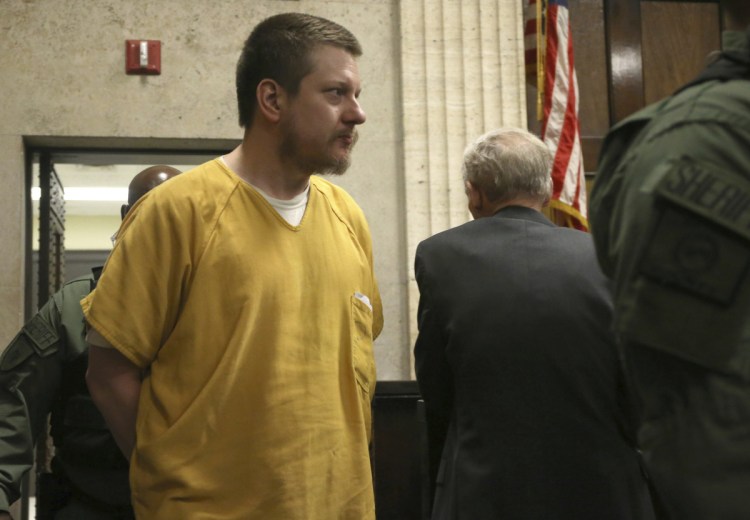CHICAGO — The white Chicago officer who gunned down a black teenager in 2014 was sentenced Friday to nearly seven years in prison, ending an explosive case that was centered on a graphic dashcam video and added fuel to debates about race and policing and law enforcement’s “code of silence.”
Jason Van Dyke was convicted last year of second-degree murder and 16 counts of aggravated battery – one for each bullet fired at Laquan McDonald.
Moments before learning the sentence, Van Dyke acknowledged the teenager’s death, telling the judge that “as a God-fearing man and father, I will have to live with this the rest of my life.”
The sentence was less than half of the penalty that had been sought by prosecutors, who asked for 18 to 20 years.
But it went far beyond the request of defense attorneys, who argued that Van Dyke could be released on probation.
Judge Vincent Gaughan predicted that no one involved in the case would be pleased with his final decision.
“I assume 100 percent of people will be disappointed,” he said.
The judge did not characterize Van Dyke’s decision to open fire, saying only that it changed both McDonald’s and Van Dyke’s families forever.
“That’s shame,” he said. “You can see the pain … on both families … This is not easy.”
After the judge’s announcement, Van Dyke’s father said, “They threw him underneath the bridge.”
His older daughter began crying and said “I want him home.”
Earlier in the day, several black motorists testified that he used a racial slur and excessive force during traffic stops in the years before the 2014 shooting.
One of those witnesses, Vidale Joy, said Van Dyke used a racial slur after pulling him over in 2005 and at one point put a gun to Joy’s head.
He said Van Dyke “looked infuriated” and seemed “out of his mind.” Under cross examination, Joy acknowledged that he did not allege Van Dyke used a slur in his first accounts of the stop.
Another witness, Ed Nance, struggled to maintain his composure as he looked across the room to identify Van Dyke. Testifying about a 2007 traffic stop, he said the officer cursed and slammed him on the car’s hood, grabbed him by the arms and pulled him to the squad car.
Hours later, Van Dyke’s relatives tried to defend and humanize him, saying he’s a good father and husband who goes out of his way to help and who is not racist.
The issue of race has loomed over the case for more than four years, although it was rarely raised at trial. One of the only instances was during opening statements, when special prosecutor Joseph McMahon told jurors that Van Dyke saw “a black boy walking down the street” who had “the audacity to ignore the police.”
Friday’s testimony came a day after a different judge acquitted three officers accused of trying to conceal what happened to protect Van Dyke, who was the first Chicago officer found guilty in an on-duty shooting in a half century and probably the first ever in the shooting of an African-American.
At the sentencing, McDonald’s uncle read a letter written from the slain teen’s perspective, telling the court that Van Dyke killed him without provocation.
“I am a 17-year-old boy, and I am a victim of murder,” Marvin Hunter said. “I am unable to speak in my own voice” because an officer “thought he would become judge, jury and executioner.”
In asking for a long sentence, Hunter added: “Why should this person who ended my life forever … who has never asked for forgiveness … be free when I am dead for forever?”
Van Dyke’s wife said her life has been “a nightmare” since her husband was charged. She said she was denied a job and her daughter was not accepted into a dance group because of their last name.
Send questions/comments to the editors.



Success. Please wait for the page to reload. If the page does not reload within 5 seconds, please refresh the page.
Enter your email and password to access comments.
Hi, to comment on stories you must . This profile is in addition to your subscription and website login.
Already have a commenting profile? .
Invalid username/password.
Please check your email to confirm and complete your registration.
Only subscribers are eligible to post comments. Please subscribe or login first for digital access. Here’s why.
Use the form below to reset your password. When you've submitted your account email, we will send an email with a reset code.